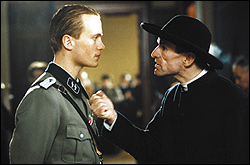The cold, burning eyes and gaunt hollows of Ulrich Matthes’ amazingly cinematic face almost stole the show from Bruno Ganz in the bunker-Götterdämmerung flick Downfall, even though Ganz operatically played Hitler and Matthes played the less dramatic demon Goebbels. Those coals have sunk still deeper into the angular ice of his face in Volker Schlöndorff’s loosely fact-based film about a Luxembourg priest, Henri Kremer, who gets a nine-day vacation from Dachau.
It’s tough to dramatize the Holocaust anymore, though one tends to get overpraised for it. (People! The Pianist was a snore!) But this film offers an unfamiliar story, the moral dilemma of anti-Nazi Christian clerics in the camps. Schlöndorff nimbly eludes cliché by using quick cuts, varying film speed, draining the red end of the spectrum from the palette, and presenting scenes we haven’t seen: a priest hoisted on a wooden cross to die; and Nazis mitigating their cruelty slightly in tormenting the ministers—partly to make the other prisoners resent them.
The film really begins when Kremer gets his trip home to Luxembourg. Gebhardt (August Diehl), an SS man who looks like he’s still in the Hitler Youth, spends most of the movie trying to talk him into endorsing Hitler’s agenda. Why Kremer? The top Luxembourg bishop won’t play ball, and Kremer is so respected that he could help convert the entire church to Nazism.
As Kremer’s personal devil, Diehl has the gleaming Gerber baby face of the young Jon Voight. At certain angles, the incipient bags under his eyes sag like the depraved young Christopher Walken. Jesuitically—Gebhardt came within days of entering the priesthood himself—he argues that Judas was a hero, and Jesus died to give us a shining example: We must kill the Jew within ourselves!
Besides, if Kremer caves, every single priest with him in the camp, plus his entire family, won’t be murdered. Gebhardt isn’t your standard “Vee haf vays uff making you talk” Nazi. If he doesn’t get Kremer’s Nazi salute, his superiors will send him to work in the concentration camps himself. His fiendish cleverness is motivated by fear of bigger fiends.
The movie also complicates the standard critique of the “Nazi Pope,” Pius XII. The Dutch bishop spoke out against Hitler, and Pius XII pointedly didn’t. The Dutch church was massacred. What should Pius XII have done? What should Kremer do—knuckle under, or flee to Switzerland with his Resistance-fighter brother? He has nine days to decide.
Schlöndorff’s speculative film is so intelligent and artful, I wish I could say it was great. But the debate doesn’t quite catch fire. As arresting as Matthes’ performance is, it’s also ultimately too static, at many points mute. His cheeks look as if he’s trying to suck them back into his body, and his character seems always to be struggling to implode and vanish without a trace. It’s an interesting effect, but it wears thin. (NR)








